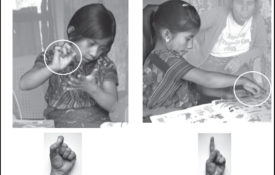-

Language and Memory Are in Focus for Latest Cattell Sabbatical Awards
Gary Lupyan, Tracy Riggins, and Elizabeth Schotter are the latest recipients of the Sabbatical Fund Fellowship from the James McKeen Cattell Fund.
-

New Content From Perspectives on Psychological Science
A sample of research on assessing autism in hard-of-hearing youths, the relationship between parenting and self-control, managing fear during pandemics, how expectations modulate pain, and much more.
-

The Self-Taught Vocabulary of Homesigning Deaf Children Supports Universal Constraints on Language
Researchers compared how young homesigners—deaf children without access to an established sign language—and English-, Spanish-, and Chinese-speaking adults describe the use of tools such as paintbrushes and knives.
-

New Research in Psychological Science
A sample of research on theory-of-mind development in deaf children, male variability in cooperation, hypnosis and visual tasks, attitude formation, early training and musical skills, whether children prioritize saving animals, and the use of moral language in the U.S. Congress.
-

Brains of Congenitally Deaf Reveal Plasticity of Auditory Cortex
Neuroimaging involving people born deaf shows the pliability in the brain area that processes auditory information.
-
Third International Conference on Cognitive Hearing Science for Communication
The Third International Conference on Cognitive Hearing Science for Communication will be held June 14–17, 2015, in Linkoping, Sweden. For more information visit www.chscom2015.se.

